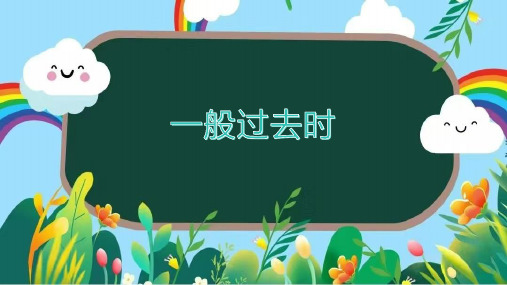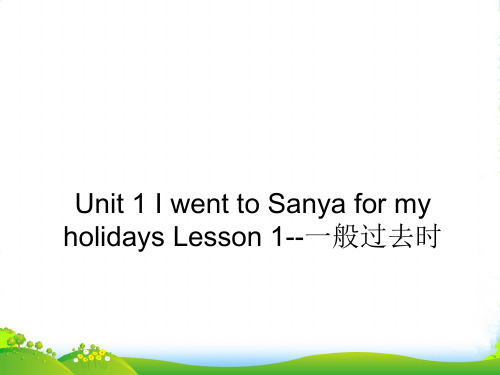英语一般过去时讲解课件
一般过去时.语法讲解PPT

一般过去时常用的时间状语包括过去的时间点、过去的时间段 等,而过去完成时常用的时间状语包括“已经”、“之前”等
。
05
一般过去时的练习与巩固
填空练习
总结词
填空练习是巩固一般过去时的有效方法,通过在句子中留空,让学生填写正确的动词时态,加深对一般过去时的 理解和运用。
详细描述
在填空练习中,教师可以选择一些包含一般过去时的句子,故意去掉动词时态部分,让学生根据上下文语境和时 态规则填写正确的时态。例如,“Yesterday, I ____(go) to the park with my family. We ____ (have) a great time.” 学生应该填写“went”和“had”。
表示过去的习惯或经常发生的动作
描述过去的习惯
一般过去时可以用来描述过去经常发 生的动作或习惯,例如“He used to smoke a pack of cigarettes a day” (他以前每天抽一包烟)。
描述过去的频率
一般过去时可以用来表示过去某个时间 段内发生的动作的频率,例如“We met every week”(我们每周见面一 次)。
一般过去时表示动作已经完成,而过去进行时则表示动作正在进行中。
总结词
时间状语不同
详细描述
一般过去时常用的时间状语包括过去的时间点、过去的时间段等,而 过去进行时常用的时间状语包括“当时”、“正在”等。
与过去完成时混淆的用法
总结词 详细描述
总结词 详细描述
动作是否完成
一般过去时表示动作已经完成,而过去完成时则表示在过去的 某个时间点之前已经完成的动作。
选择练习
总结词
选择练习是一种常见的练习方式,通过提供多个选项,让学生选择符合语境和语法规则的答案,进一 步巩固一般过去时的运用。
一般过去时(12张PPT)初中英语专项复习课件

一般过去时 初中英语专项分析
一般现在时 de 应用场景
过
动作行为
去
发
生
曾经
的
存在的状态
识别 标志词 理解 句意
答题技巧
熟练 动词 转换
yesterday last week 3 days ago
动词 过去式
熟练 句型 转换
肯定 否定 疑问
一般 过去时 He played basketball yesterday.
yesterday? Yes, I did. No, I didn’t.
动词 过去式 形态的变化
一般
直接加 ed
二般
以 e 结尾,去 e 加 ed live dance hope use
动词 过去式 形态的变化
三般
重读辅元辅,双写尾字母
stop plan
四般
辅音字母 + y 结尾,把 y 变 i 加 ed cry study worry
标志词
时间状语:last night, yesterday, the day before yesterday last week, some years ago in 1995, the other day, just now, in the past
小学英语时态之 一般过去时讲解课件ppt

一般过去时:
定义: 一般过去时,是表示过去某一时刻或某一段时间内发生的动作或存在
的状态。
标志词: yesterday, just now, …ago, last…, this morning …
结构: 谓语是be动词
谓语是行为动词
肯定句: 主语+ was/were + 其他 否定句: 主语+ was/were + not + 其他 一般疑问句: Was/Were + 主语+其他? 肯定句: 主语+ 动词的过去式 + 其他 否定句: 主语+ didn’t +动词原形 + 其他 一般疑问句:Did + 主语+ 动词原形 +其他?
at the weekends this morning often
usually
last Mid-Autumn Festival
every day three days ago on Mondays
tomorrow a moment ago 14 years ago
找出表示一般过去时的时间副词。
( B) 1. My mother had breakfast and____to work.
A. go B. went C. going D. to go
( A)2. -- How __ your vacation?
-- It was pretty good. A. was B. were C. did D. do
( )3.Each student one picture.
A.draw B. draws C. drawing D.to drawing
一般过去时课件(PPT)课件

用动词的适当时态填空
____ you ________ (remember) to buy the oranges yesterday? 2.Who ________ (play) computer games yesterday. 3.We _____ (go) to the cinema last night. The film _____ (be) very good. 4.What time ____ you ____ (get) to school this morning? 5.Jim ___ (do) a lot yesterday. He ____ (go) shopping and ______ (cook) supper.
lived
ate
had
made
played
cooked
Did
规则变化 1.一般加ed
2.以e结尾加d
3.末尾只有一个辅音字母的重读闭音节词,先双写这个辅音字母,再加ed .
work —
worked
change —
changed
prefer —
preferred
stop —
stopped
study —
didn’t do
Did
find any
How long did
stay
Was
any
Thank you
CLICK HERE TO ADD A TITLE
单击此处添加文本具体内容
演讲人姓名
do/ does
didn’t
did
didn’t watch
一般过去时(课件)

一般过去时(课件)一般过去时是英语中表达过去某个时间点或时间段发生的动作或状态的一种时态。
在一般过去时中,动词的形式需要根据主语的人称和数进行变化。
一般过去时的句型结构是:主语 + 动词过去式 + 其他。
一、一般过去时的构成1. 规则动词:在动词原形的基础上加上ed。
例如:work → worked, play → played, study → studied。
二、一般过去时的用法1. 表示过去某个时间点发生的动作。
例如:I went to the library yesterday.2. 表示过去某个时间段内发生的动作。
例如:We playedfootball last weekend.3. 表示过去某个时间段内的状态。
例如:She lived in New York for five years.4. 表示过去习惯性动作。
例如:He used to smoke when he was young.三、一般过去时的疑问句和否定句1. 疑问句:将助动词did放在主语之前,动词原形放在助动词之后。
例如:Did you watch the movie last night?2. 否定句:在主语和动词之间加上助动词did,动词原形变成动词的过去式,并在动词过去式前加上not。
例如:I didn't finish my homework yesterday.四、一般过去时的特殊用法1. 过去进行时:表示过去某个时间点正在进行的动作。
例如:What were you doing at 8 o'clock last night?2. 过去完成时:表示在过去某个时间点之前已经完成的动作。
例如:I had finished my work before he came.3. 过去完成进行时:表示在过去某个时间点之前一直在进行的动作。
例如:She had been waiting for two hours when he finally arrived.一般过去时(课件)一般过去时是英语中表达过去某个时间点或时间段发生的动作或状态的一种时态。
一般过去时讲解课件(共19张PPT).ppt

否定句
1) 主语+wasn’t/weren’t+表语
He wasn’t a student ten years ago.
2) 主语+didn’t+动词原形+其他
They didn’t have a good time last night.
4.一般过去时的结构
一般疑问句
was为单数; were为复数
一般过去时的结构
4.一般过去时的结构
was为单数; were为复数
肯定句
1) 主语+was/were+表语
He was a student ten years ago.
2) 主语+动词过去式+其他
They had a good time last night.
4.一般过去时的结构
was为单数; were为复数
时间+ago类 in+年份类
yesterday morning;yesterday.... last night; last week...
two days ago in 2023
动词过去式的变化
3.动词过去式的变化 1.直接加ed work--worked look--looked 2.不发音的e结尾,去e加ed hope--hoped like--liked 3.重读的闭音节词,双协结尾字母加ed stop--stopped plan--planned 4.以辅音字母加y结尾,变y为i再加ed study--studied try--tried 5.不规则变化
What did they do last night?
总结与练习
5.总结与练习
一般过去时 1.定义:表示一个过去发生的动作或表示过去存在的状 态 2.标志词:yesterday,last...,....ago, just now..... 3.动词的过去式变化 4.一般过去时的各种句型:
《英语一般过去时》课件

It can also be used to express returns or wishes about the past, such as "I wish I had gone to the concert" or "I return not having studied hard for the exam"
03
The sensitivity structure of the simple
past tense
Basic presence structure
I (subject) (verb) a (object)
write letter
Verb+Object: He
(subject)
won
(verb) a size
02
"We (subject) camera (Verb) from the airport (preliminary
phase)."
Subject+Verb+Infinite Phrase
03
"She (subject) wanted (Verb) to go shopping (Infinite
Simple past tense is often used to express past experiences or facts that are no longer relevant or meaningful in the presentation For example, "I learned how to swim when I was five years old" or "The Great Wall was built in ambient times."
新人教精通版六年级英语下册:Unit 1 Lesson 1--一般过去时的知识点-课件

肯定句: They swam in the lake yesterday.
否定句: →They didn’t swim in the lake yesterday.
一般过去时否定句练习
肯定句: They made a kite a week ago. 否定句:They didn’t make a kite a week ago.
in 1990 just now (刚才) long long ago(很久以前)
• (2)They were in Li Yan’s home last night.
• → Were they in Li Yan’s home last night? • (一般疑问句)
• →Yes, they were. (肯定回答) • →No, they weren’t. (否定回答)
Unit 1 I went to Sanya for my holidays Lesson 1--一般过去时
past now
future
动词过去式 的构成
规则动词
regular verbs
不规则动词
irregular verbs
规则动词 过去式的构成
1、一般在动词末尾加– ed
look
look ed
肯定句: He was ill yesterday. 否定句:He was not ill yesterday.
肯定句:The cat ate a bird last night. 否定句:The cat didn’t eat a bird last night.
一般过去时的 一般疑问句
一般过去时讲解PPT课件

did
助动词,用于构成一般过去时的 疑问句和否定句。
主语
句子中的动作执行者,可以是名 词、代词等。
例如
What did you do yesterday? 你 昨天做了什么?
其他成分
包括宾语、状语等,根据句子需 要而定。
动词原形
指动词的基本形式,即不加任何 时态或语态标记的形式。
特殊疑问句实例分析
when、after、 before、as等引导的 表示过去的时间状语 从句。
已经、曾经、刚才、 那时等表示过去的时 间副词。
02
一般过去时肯定句结构
主语+动词过去式+其他成分
01
02
03
主语
句子中的主体,可以是人 、物或抽象概念。
动词过去式
表示过去某个时间里发生 的动作或状态。动词的过 去式可分为规则变化和不 规则变化两种。
表示过去某个时间里发生的动 作或状态。
用法
陈述过去的事实或情况,描述 过去经常或反复发生的动作。
现在完成时
表示过去发生的动作对现在造 成的影响或结果,或从过去已 经开始,持续到现在的动作或 状态。
用法
强调过去与现在的联系,表达 一个动作从过去一直延续到现
在。
两者在时间状语上的区别
01
02
03
04
一般过去时
一般过去时讲解PPT课件
目录 Contents
• 一般过去时基本概念 • 一般过去时肯定句结构 • 一般过去时否定句结构 • 一般过去时疑问句结构 • 一般过去时特殊疑问句结构 • 一般过去时与现在完成时的比较
01
一般过去时基本概念
定义与作用
定义
一般过去时表示过去某个时间里 发生的动作或状态。
英语八大时态PPT课件(详细版)

A
知识导航
种类
一般现在时 一般过去时 一般将来时 现在进行时 现在完成时 过去进行时 过去完成时 过去将来时
构成
do/does did will/shall+动词原形 am/is/are + doing have/has+过去分词 was/were + doing had+过去分词 would/should+动词原 形
A
4
※表示主语所具有的特征、性格、 能力、状态等
She is a middle school student. She looks a little worried. ※某些以here/there开头的句子 中,用一般现在时表正发生的动 作
Here comes the bus.
A
5
※表示将来发生的、时刻表上不改变的事 The train leaves Hunan at five o’clock. ※特殊情况 在时间状语从句和条件状语从句中,若主 句用一般将来时,则从句用一般现在代替 将来。(主将从现)
A
21
四、一般将来时
1、构成 一般将来时态由
“will/shall+动词原形”构成,me to ask Mary for help.
A
22
2、其他表示
※be going to +动词原形:表示 说话人主观的打算或预测。 I am going to look for a job here. It is going to be a fine day for camping tomorrow.
【小试牛刀】 他们昨天这个时候正在吃晚餐。
They were having dinner this time yesterday.
一般过去时(34张PPT)初中英语专项复习课件

say(说) said find(找到) found have/has(有) had make(制造) made break(打破) broke choose(选择) chose forget(忘记) forgot speak(说,讲) spoke wake(醒) woke drive(驾驶) drove eat(吃) ate fall(落下) fell give(给) gave rise(升高) rose ride(骑) rode write(写) wrote do(做) did
新知讲解
典型示例
㈣ 表示过去经常反复发生的动作。
1. He often played basketball when he was in college. 他在大学时,他经常打篮球。
2. He rode for half an hour every morning when he wasyoung . 年轻时她每天早上骑半小时的自行车。
keep (保持) kept sleep(睡) slept sweep(扫 swept
不规 则变化
build(建设) built lend(借出) lent send (传送) sent spend(花费 spent catch(抓住 caught teach(教) taught bring(带来) brought fight (战斗) fought buy(买) bought think(想) thought
新知讲解
一般过去时动词谓语的构成: (一)be的一般过去时 口诀:过去状态主系表,was和were不可少,我用was,你用were,,
单数was 复数were。 解读:描述主语过去状态的句子,就用主系表结构。
陈述句语序:主语+ 系动词(be)+ 表语。表语是用来说明主语是什么、
讲解(一般过去时)ppt课件

4. _____________________at breakfast. But yesterday he didn’t read the newspaper.
5
动词一般过去时,表示过去发生的事; be用was或用were, have,has变had; 谓语动词过去式,过去时间坐标志; 一般动词加-ed,若是特殊得硬记。 否定句很简单,主语之后didn’t添; 疑问句也不难,did放在主语前; 如果谓语之前有did,谓语动词需还原; 动词若是was,were,否定就把not添。
10
• 一.改错
• 1. He watch TV here ten minutes ago. 他十分钟前在这里看电视。
watch在这这个动作是十分钟前发生的,属于过去时,所以 动词里是错误的,我们要把它改成过去式watched。
。2. They didn’t played basketball yesterday. 昨天,他们没有打篮球。
5. I usually go shopping on weekends. But this weekend __________________________
12
• 三.句型转换
1.I was so sleepy .(变为否定句) ______________________
2.He liked playing computer games.(变为否定句) _____________________
9
• 不规则动词的变化规律不明显,需要平时 多加记忆。
• 1.do—did 2. is/am—was 3.are—were • 4.have—had e—came 6.put—put • 7.make—made 8.drive—drove 9.get—got • 10.eat—ate 11.dig—dug 12.dig—dug • …………
最新一般过去时精讲ppt课件ppt

一、一般过去时之概述
2.表过去的时间状语:
yesterday, last night,
three days ago, one day, that winter, in 1990等
3.频度副词: often week 等
always
once a
用于一般过去时的时间状语
1.与last 连用
7.其他时间状语:
(1)刚刚 just now; (2)前几天 the other day; (I saw him in Paris the other day.) (3)从前 once upon a time (4)很久很久以前 long long ago
二、一般过去时之谓语变化
所有时态都是通过动词变化来表现的
help -- helped
ask -- asked
look→looked
2、e结尾的只加-d。hope→hoped来自love -- loved
dance -- danced live→lived
3、 最后三个字母辅元辅音,先双写,然后才
能加-ed。
stop→stopped plan(计划) →planned
build→built,lend→lent, send→sent,spend→spent 2.结尾d变t 如:
ring→rang,sit→sat, drink→drank, sing→sang,swim→swam,begin→began, give→gave 3.遇见i改为a 如:
ride→rode,drive→drove,write→wrote
last
time night Monday
week
month
- 1、下载文档前请自行甄别文档内容的完整性,平台不提供额外的编辑、内容补充、找答案等附加服务。
- 2、"仅部分预览"的文档,不可在线预览部分如存在完整性等问题,可反馈申请退款(可完整预览的文档不适用该条件!)。
- 3、如文档侵犯您的权益,请联系客服反馈,我们会尽快为您处理(人工客服工作时间:9:00-18:30)。
4.sweep-swept keep-kept sleep-slept can-could shall-should will-would
一般疑问句
1.My teacher spoke English last class. 2.Sarah stayed at home last weekend. 3.Robin sent us a postcard yesterday morning. 4.A little boy come here five minutes ago. 5.Your baby brother cried without mommy.
There was a new student in the class.
There is a cute Martian at school.
There was a cute Martian at school.
There are minions in my house.
There were minions in my house.
park. 7. What _d_id___(do) you _d_o___(do) in here last Spring Festival?
I _c_o_m__e (come) to see my relatives(亲戚).
特殊疑问句
特殊疑问词+一般疑问句
Where did you go? What did you do at home? When was your birthday? Who was singing under the tree?
C. will do D. did
6. _B__ you ______ TV last night? A. Do, watch B. Did, watch C. Did, watched D. Do, watched
7.--Did your father write an e-mail? --__A______ A. Yes, he did. B. No, he did. C.Yes, he does. D. No, he don't.
2. We __C___ to Shanghai with my parents five days ago.
A. go
B. will
C. went
D. is going to
3. There __B___ a basketball match yesterday afternoon.
A. were
一般过去时
一般现在时:现在经常发生的动作或存在的状态。
Past
Now Future
一般过去时: 过去经常发动 作或存在的状态。
一般将来时: He will go to school tomorrow.
现在进行时: He is going to school now.
B. was
C. is
D. had
4. She watered the flowers ___C_____. A. tomorrow B. sometimes C. last week D. everyday
5. What __D___ Mike do last weekend?
A. do
B. does
There was/were...
Was there...? Yes, there was.
No, there wasn't.
Were there...?
Yes, there were. No, there weren't.
There is a new student in the class.
与“before”连用的
4
the day before yesterday,
the week before last,
the year before last,
the spring before last
一般过去时
1. 我昨天乘公交车上学。
I went to school by bus yesterday.
3 When did they have an English party?
附赠图标
THANKS.
There is a dragon baby in my book.
There was a dragon baby at school.
Dragon Baby
1. I knew that you__D___ a good time in Beijing.
A. have
B. are having
C. will have D. had
She played baseball last Monday.
他昨天下午有英语课。 He had English class yesterday afternoon.
Max两天前和她的朋友去 钓鱼了。
Max went fishing with her friends two days ago.
一般疑问句
We went shopping last Monday.
What did you do after class?
We played games after class.
What did they do yesterday afternoon?
They danced yesterday afternoon.
2. 我们上周一在家做作 业。
3. 她早上洗脸了。
We did homework at home last Monday. She washed your face in the morning.
4. 他昨天下午吃了水果。 He ate fruit yeasterday afternoon.
翻译
她在上周一打棒球。
如:play-played
4.以“辅音字母+y”结尾的动词,变y为i加-ed
如:study-studied carry-carried
1.swim-swam drink-drank ring-rang sing-sang give-gave sit-sat begin-began
2.drive-drove ride-rode write-wrote get-got forget-forgot speak-spoke break-broke
8. They ___C_____ on a trip in February, 2007.
A. are going B. go
C. went D. goes
1. He_v_i_s_it_e_d_(visit) the Great Wall last year. 2.We__h_a_d___(have) a good time yesterday. 3. I ___l_iv_e_d__(live) in the village when I was a child.
4. Mike__s_a_w___(see) a big tiger in the nature park last summer. 5. _D__id__(do) you __e_n_jo_y___(enjoy) yourself yesterday?
No, I didn't. I _d_i_d_n_'t __e_n_jo_y__ myself. 6. We _d_i_d_n_'t__g_o____ (go) to the zoo yesterday. We _w_e_n_t (go) to the
We went fishing last Monday. Did we go fishing last Monday? Yes, we did.We went fishing next Monday. No, we didn't.We didn't go fishing next Monday.
didn't=did not
1.put-put read-read let-let hurt-hurt cut-cut cost-cost hit-hit set-set
与“yesterday”连用的
yesterday morning,
yesterday afternoon,
1
yesterday evening,
与“last”连用的 3
一般疑问句
1.My friend went to Shanghai last summer. 2.Two officers talked to you just now. 3.The ugly monster ate us in the end. 4.We played Plants&Zombies last night. 5.I went to colloge three years ago.
What did they have an English party last week? do
特殊疑问句
They had an English party last week.
①
1 Who had an English party last week?
2 What did they have last week?
last Monday, last week,
last month, last season,
last spring, last year
与“ago”连用的
一段时间 + ago:一段时间以前
two days ago, a week ago,
